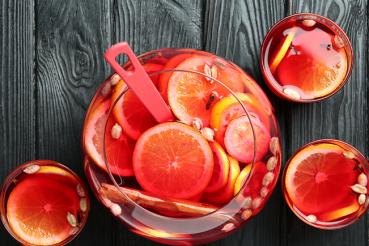Juice fasts. Colon cleanses. Salt baths. Detoxifying face masks. Countless stores, websites and infomercials market these and other products that claim to "rid your body of toxins," in the words of one major retailer.
They're not promoting the kind of detox that is an important part of substance abuse treatment. Instead, they're selling solutions to a problem that is essentially made up. They imply you have "toxins" in your body so that you think, "I've got to get rid of these things." The problem is that the people marketing these products never mention what the toxins actually are.
That brings us to the first thing you should know before you try any product or program that promises to "cleanse," "detox" or "flush" your body of toxins:
1. Cleanses and detox products do nothing to remove toxic substances.
The reason marketers tend not to define "toxins" is that there aren't generally any poisonous substances that these types of products can remove from your body.
A detoxifying' cleanser or face mask can remove dirt from your skin, like soap, but it's not pulling toxins out of your bloodstream. That's a mischaracterization.
Similarly, juice cleanses might temporarily bring your weight down or make your stomach feel empty, but that's simply because you're consuming fewer calories. They don't actually cleanse anything, though they can prevent you from getting needed nutrients and interfere with the workings of your metabolism.
Outside a narrow range of specific doctor-prescribed medical uses, colon cleanses, whether in tablet or enema form, serve no purpose at all. They may even injure you (see No. 4 below). Those who sell them often suggest that toxic substances can seep into your blood from your stool, particularly if you suffer from constipation. But this theory, sometimes called autointoxication, is completely discredited.
2. Your body can actually get rid of 'toxins' on its own.
Luckily for us, our bodies are already very good at getting rid of substances that don't belong in them.
A good example is your lungs. They exhale carbon dioxide, of course, and they also have little fibers called cilia that push contaminants out. So if you breathe in any particles that shouldn't be there, they get trapped by mucus in the cilia and you cough it up or swallow it, and it goes away. (Among the many dangers of smoking is that it can damage your cilia.)
Lungs aside, the three major organs that eliminate waste and harmful substances are the liver, kidneys and colon.
Your colon, or large intestine, is like a self-cleaning oven that has evolved over hundreds of thousands of years. After your small intestine absorbs the nutrients from what you eat and pushes them into your bloodstream, your large intestine gets rid of whatever remains.
The liver plays a key role in digestion, too, but it also performs many other functions. One of these is filtering your blood to neutralize, and help your body get rid of, potentially harmful substances. "Whether you eat it, put it on your skin or inhale it — however something gets into your bloodstream, the liver is going to process it," explains Nancy Reau, MD, a hepatologist (liver specialist) at Rush.
Your kidneys filter your blood as well, removing byproducts of digestion and other bodily processes by producing the urine that flushes them from your body.
3. If substances toxic to your body do cause you harm, you need proven treatments.
Sometimes, of course, things do go wrong in this process. While your body is able to safely process most of the substances you encounter in daily life, some exposures can lead to disease.
Tobacco smoke, for example, causes lung cancer and other conditions. And you have probably heard about asbestos, a substance commonly used in construction before the 1970s, when it was found to cause cancer.
Many substances are relatively safe in small quantities, but can be harmful in larger amounts. Having a glass of wine with dinner is unlikely to make you sick, but people who consume more than three and a half drinks a night are two to three times more likely than others to develop certain types of cancer.
If you believe you have been exposed — or are exposing yourself — to substances that may cause you harm, talk to your primary care doctor. They will recommend appropriate screening tests and treatments, or refer you to a specialist who can do so.
Products marketed as liver and kidney cleansing agents can actually strain the organs they are intended to help.
4. Some 'cleanses' can harm you.
Avoid any product or service that claims to cleanse your kidneys, liver or colon. Such products are ineffective and unnecessary. More worryingly, they can cause injury.
Colon cleanses involving enemas — also marketed as colonic irrigation or colonic hydrotherapy — can actually cause injury to the large intestine.
They can put too much pressure on the colon, causing it to blow out like a balloon. Or the tip of the enema device may cause damage to the wall of the rectum or the anal canal, leading to bleeding, abscesses and infection, which sometimes require surgery to repair.
Whether it comes as an enema or via a tablet, any kind of colon cleanse can leave you dehydrated, throw off your balance of electrolytes and disrupt your natural gut bacteria levels. If you end up with too few "good" bacteria, too many harmful bacteria may grow, leading to inflammation of your colon.
Similarly, products marketed as liver and kidney cleansing agents can actually strain the organs they are intended to help. "Some of these remedies contain substances that have been shown to contribute to chronic kidney disease because of toxins they contain," says Vasil Peev, MD, a nephrologist (kidney specialist) at Rush.
5. Others involve deceptive tricks.
Some so-called detoxifiers go beyond vague marketing claims, explicitly deceiving consumers.
For example, certain colon cleanse tablets contain polymers, substances that bind to stool and change its consistency so that you end up passing what looks like long gray ropes. And products marketed as "detoxifying foot pads" contain a chemical that turns black when it comes into contact with sweat.
These are actually designed to trick people into feeling that things are being removed from their bodies.
6. You're better off addressing the underlying problem.
So what can you do if you feel like you need a good internal scrubbing?
"If you're thinking about a detox, think instead about the underlying problem," Reau advises. "If you just want to be more healthy, good diet choices and exercise are best. And some symptoms, such as weight gain or fatigue, should be evaluated for causes that can be addressed."
If you're always feeling tired, for example, you may not be getting enough sleep. If you're gaining weight, you may not be getting enough exercise or eating a balanced diet. If you're constipated, consuming more fiber and drinking more fluids might help. If problems persist despite your efforts to address them, talk to your primary care doctor.
The bottom line: There's no substitute for making healthy choices. Just like anything else, if it sounds too good to be true, it probably is.




